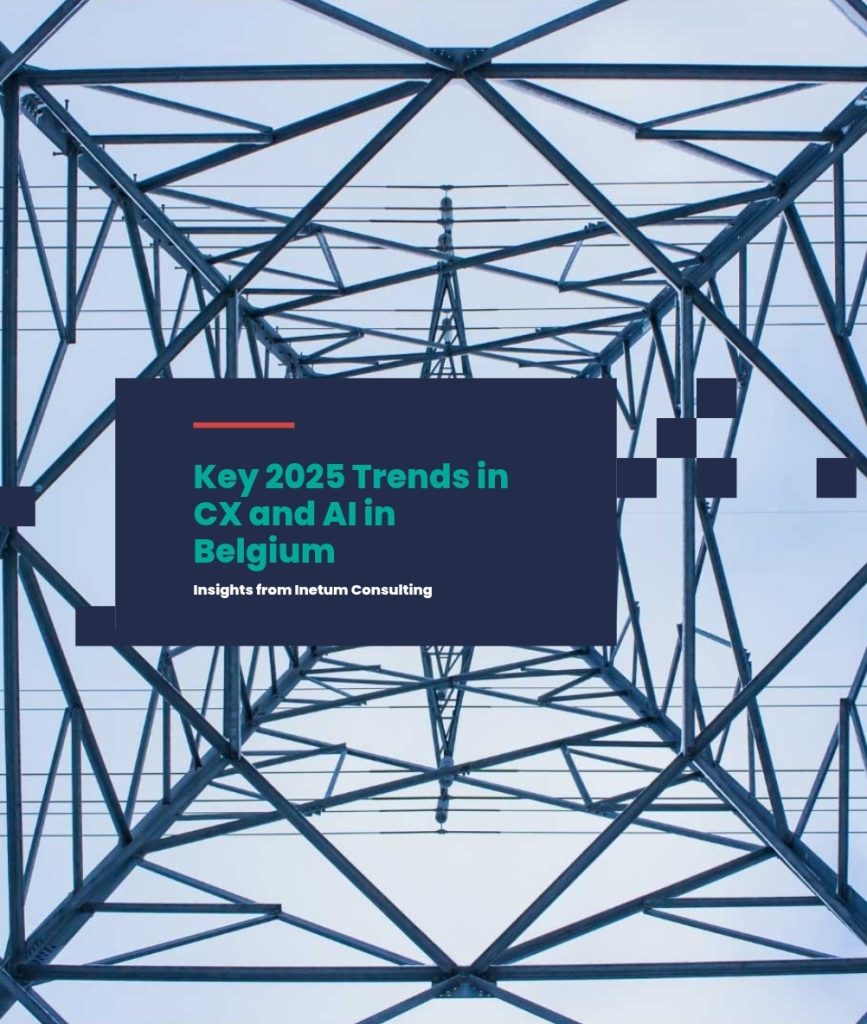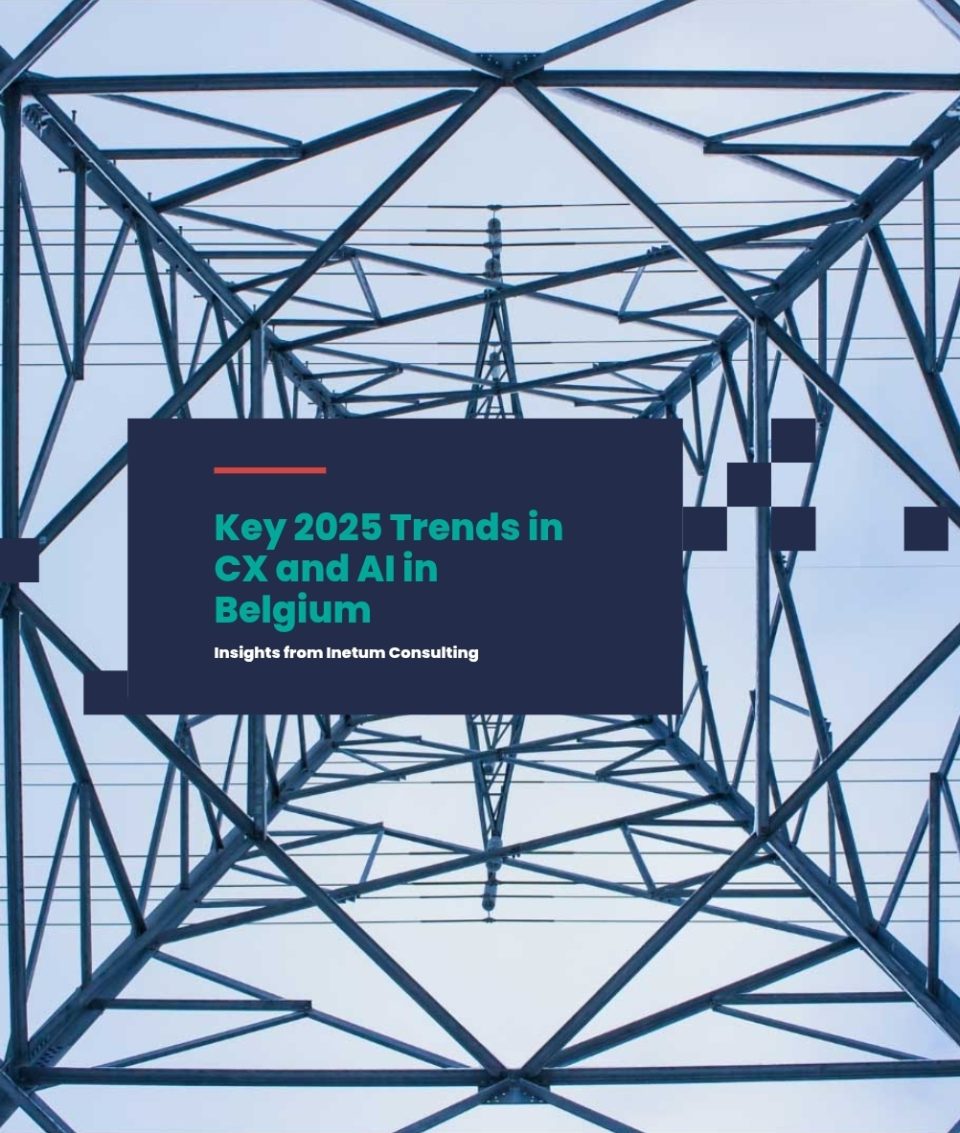Key 2025 Trends in CX and AI in Belgium: Insights from Inetum Consulting
In 2025, the evolution of customer experience (CX) and artificial intelligence (AI) takes a major leap forward. The focus shifts from operational efficiency to delivering emotional value in customer interactions. Hans Borghgraef, Head of CX, UX, and Data & AI Consulting at Inetum in Belgium, sheds light on these transformative trends. By embracing these emerging developments, organizations can unlock new opportunities to foster trust, personalization, and proactive collaboration with customers.
Emotional Excellence: The Next Frontier
AI has long been valued for streamlining processes and improving accuracy. However, in 2025, organizations are moving toward achieving “Emotional Excellence.” This shift emphasizes creating emotional resonance in customer interactions through AI-driven hyper-personalization. For example, generative AI (GenAI) can now refine empathetic communication, even in challenging situations such as healthcare or complaint management.
With this trend, “Human-AI collaboration” becomes pivotal. Automated customer interaction systems must allow seamless human intervention in sensitive situations. This balance ensures that AI complements, rather than replaces, human empathy. As organizations prioritize emotional intelligence in AI, customers will feel more valued and understood.
Digital Authenticity in Key 2025 Trends: Trust as the Cornerstone
In an era where deepfakes and AI-generated content are prevalent, digital authenticity takes center stage. Customers increasingly demand transparency about how organizations use AI and process their data. To address this need, companies are establishing strict guardrails for AI systems to ensure they operate ethically and authentically.
Transparency fosters trust, as customers gain insights into how their information is handled. AI tools in 2025 will not only support decision-making but also provide verifiable, personalized stories that connect with customers on a deeper level. By doing so, businesses can strengthen relationships and build lasting loyalty.
Moreover, AI applications will move away from intrusive content creation. Instead, they will focus on enriching the customer journey with meaningful and trustworthy experiences. This transition highlights the growing importance of trust as the foundation for any customer interaction.
Multi-Modal AI: Enabling Richer Experiences
Generative AI is evolving beyond textual data to include diverse formats such as images, audio, and video. This expansion, known as multi-modal AI, is transforming customer experience by enabling richer, more interactive interactions. In 2025, customers can communicate through their preferred channels—whether via text, voice, or visuals—making interactions more comfortable and intuitive.
Multi-modal AI enhances the ability to understand customer intentions and emotions by analyzing data from multiple sources simultaneously. This results in more accurate and personalized responses, ultimately improving customer satisfaction. For instance, AI-powered systems can detect frustration in a customer’s tone during a call and tailor solutions accordingly.
Additionally, multi-modal AI ensures operational efficiency without compromising the quality of customer interactions. Organizations can address problems faster and more effectively, striking a balance between cost efficiency and exceptional customer service.
The New Role of AI: From Solver to Co-Creator
A groundbreaking development in 2025 is the emergence of “Agentic AI.” Unlike traditional AI, which reacts to specific commands, agentic AI operates proactively and autonomously. It identifies needs independently and takes action to add value without human prompts.
This evolution represents the first steps toward self-managing AI ecosystems. However, the immediate focus is on positioning AI as a co-creator. In this role, AI collaborates with humans in a dynamic, cyclical process: AI generates ideas, humans refine them, and AI iterates further.
Generative AI tools play a critical role in this transition by leveraging their predictive capabilities. They anticipate customer needs, quickly adapt to changes, and engage in meaningful dialogues with both customers and organizations. This proactive personalization allows businesses to stay ahead of customer expectations.
The shift from solver to co-creator signifies a new era of innovation. AI becomes a partner in driving creativity and decision-making, ultimately enabling organizations to offer highly customized and future-ready solutions.
Key 2025 Trends: The Path Forward
As AI and CX evolve in 2025, organizations in Belgium and beyond must adapt to these trends to remain competitive. By focusing on emotional excellence, digital authenticity, multi-modal AI, and agentic AI, businesses can elevate their customer experience strategies.
The key lies in fostering trust, personalization, and collaboration. Customers will value interactions that resonate emotionally, feel authentic, and anticipate their needs. Organizations that prioritize these principles will thrive in a rapidly changing landscape, where technology and humanity converge seamlessly.

In conclusion, the future of CX and AI is not merely about technological advancements but about creating meaningful connections. By embracing these trends, businesses can redefine customer relationships, setting a new standard for excellence in 2025 and beyond.

